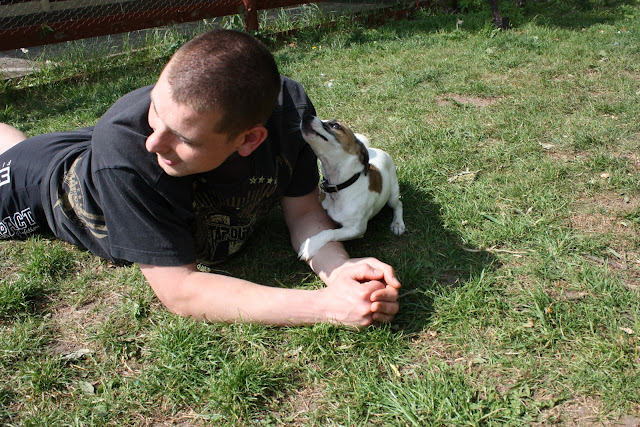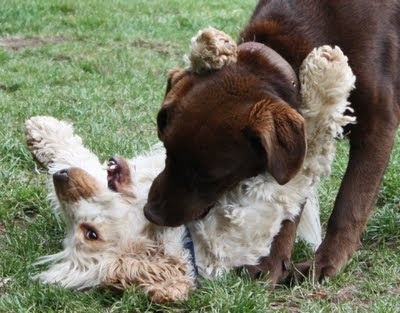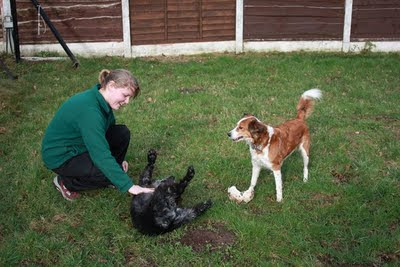Most dog owners want their dog's stay in boarding kennels to be a stressless and enjoyable experience. Here at Woodland View Kennels we do our part, by giving the dogs lots of care, attention and playtime, on top of making sure the dogs are eating well, and looking and feeling healthy. But is there anything owners can do which can help make their dog's stay in kennels a happier one?
Alone time
Although here at Woodland View Kennels we spend lots of time playing with the dogs, but of course there are times when they will be left alone (well we can't have twenty dogs sleeping on our bed!). Now, if your dog sleeps downstairs at night, and you go out to work in the day, it is likely that they will be quite confident being left on their own. These dogs seem to settle into the kennel routine much faster and rarely cry or bark when left alone.
It breaks our hearts when a dog cries when we close up the kennels at night. Of course we always use DAP spray which helps to comfort them, but we think it would be helpful if owners worked on any obvious separation anxiety issues at home before the dog's stay in kennels. This can be done by building up your dog's 'alone' time slowly. Perhaps give them a chew or special toy to help entertain them. There are some great boredom breaker toys on the market, such as Kongs or treat balls. Don't worry if they cry at first, they will soon get used to being on their own, and will be more confident dogs in the long run.
Can your dog be left alone? It may be useful to work on building up your dog's confidence before a stay in kennels.
Social skills - with other dogs
We find that social dogs are very happy staying at kennels. They just love meeting and playing with new friends, and its a joy to watch them do so, my favourite part of the job! Any puppies that stay in the kennels I make a real effort to socialise, not only with other pups and playful types, but if they need a little discipline (ie they are a bit nippy or boisterous) my own dogs Freddie and Amber are good at teaching them a valuable lesson or two. I can trust them to tell the pups off but they'd never bite or hurt them. Hopefully the lessons they learn will help keep them safe from any grumpy dogs they may meet during their usual walks. Knowing when to leave someone alone could potentially save them from being hurt at some point.
Our own dog, Amber (Collie on the right) is very good at teaching puppies 'doggie manners'
Puppies are easy to socialize, what is difficult for us is when older dogs come in and haven't been able to spend time with other dogs. Of course, we don't mind having these dogs in to board with us. Often, we can still put these dogs in with our own so they still get a valuable opportunity to socialise, but sometimes daren't risk mixing them with other boarders. Sometimes they just have to be played with alone. This is fine, and sometimes, can't be helped, and they still have fun.
(Above) Social dogs have a great time in kennels and love meeting new friends.
(Above) Don't worry if you think your dog might be a bit scared of other dogs, there is always someone there to supervise and reassure, and they soon become confident!
and if your dog isn't social - not to worry - they will still have lots of fun!
I suppose what I am saying is, IF you are lucky enough to have the opportunity to socialise your dog, then it is well worth the effort it takes to do so. You could join a training class or agility club, arrange to meet with other dog owners down the park every so often, or if you are short on time then it may be worth taking them to a 'doggy daycare' every once in a while.
Social skills - with new people
It is much harder for us to care for a dog who is wary of strangers, than if it with a happy go lucky type who loves everyone. If possible, try to get your dog used to seeing different people and accepting them. Again, this is best done at a young age.
It usually doesn't take us more than a couple of days to bond with even the most nervous/aggressive dog, and often, once you have bonded with a dog of this character, he is your best friend for life! But of course, kennels are less stressful for dogs who are 'stranger friendly' than those who aren't.
Is your dog 'people friendly'? Patch certainly was!
Basic Training
This seems fairly obvious (and of course we don't expect small puppies to have learned everything!) but it is much easier for us, and the dog, when they know a few basic commands. Their name, Recall, Sit, and good lead manners are always nice ones to know, and if there's anything you want us to work on during your dog's stay- let us know! We find some dogs love to learn new commands and its a great way to provide mental stimulation.
Training is a fun way to bond with the dogs and provide mental stimulation.
This article was a challenge to write - mainly because I didn't want to come across as lecturing people! Of course we realise that sometimes it is not possible to turn back time and make your dog a puppy again in order to do all of these things. I have a rescue dog myself, so I realise that they often come with their own baggage and experiences - and often have not had the best start it life, and also, sometimes our circumstances mean that its just not possible to do all these things, even when we have had our dog's from puppies. But all I'm saying is that, if you can, then these things are well worth working on, as your dog's life will be much easier with these skills.
Here at Woodland View we welcome any dog, regardless of how well trained or friendly they are. Infact, we like the challenge some dogs give us, and there is nothing more rewarding than seeing a nervous dog's confidence grow. Often this new found confidence and improved behaviour stays with them when they return home, we have had many a grateful owner report back to us with improved behaviour and confidence, and it's lovely to hear.















